新概念英语第二册-Lesson 34 Quick work (共28张PPT)
文档属性
| 名称 | 新概念英语第二册-Lesson 34 Quick work (共28张PPT) | 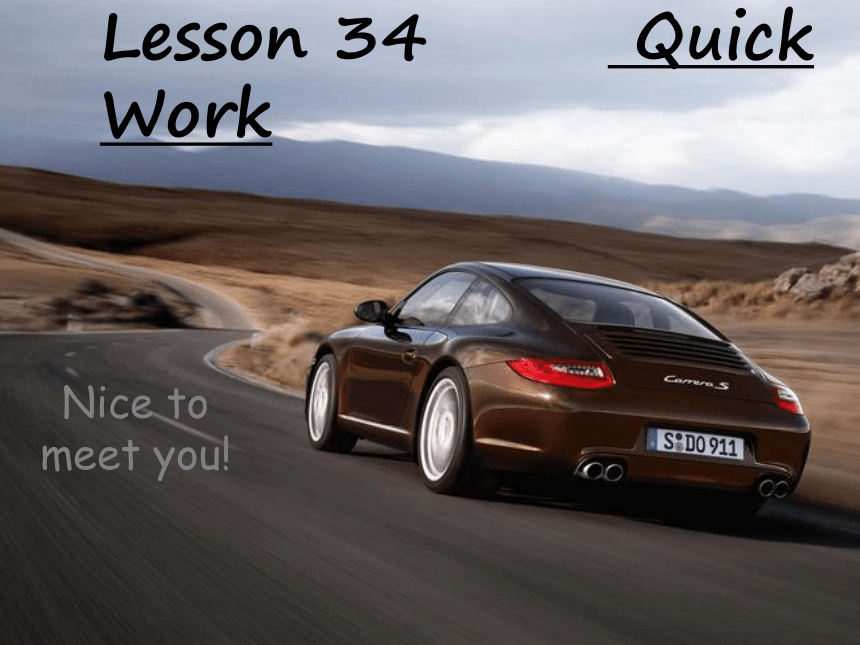 | |
| 格式 | ppt | ||
| 文件大小 | 1.1MB | ||
| 资源类型 | 教案 | ||
| 版本资源 | 新概念英语 | ||
| 科目 | 英语 | ||
| 更新时间 | 2023-10-06 19:38:40 | ||
图片预览

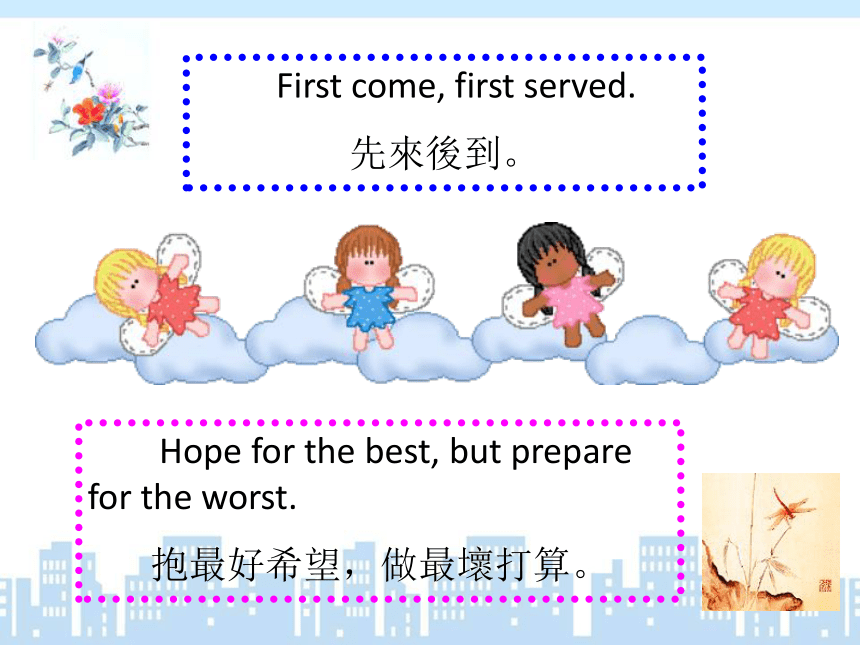
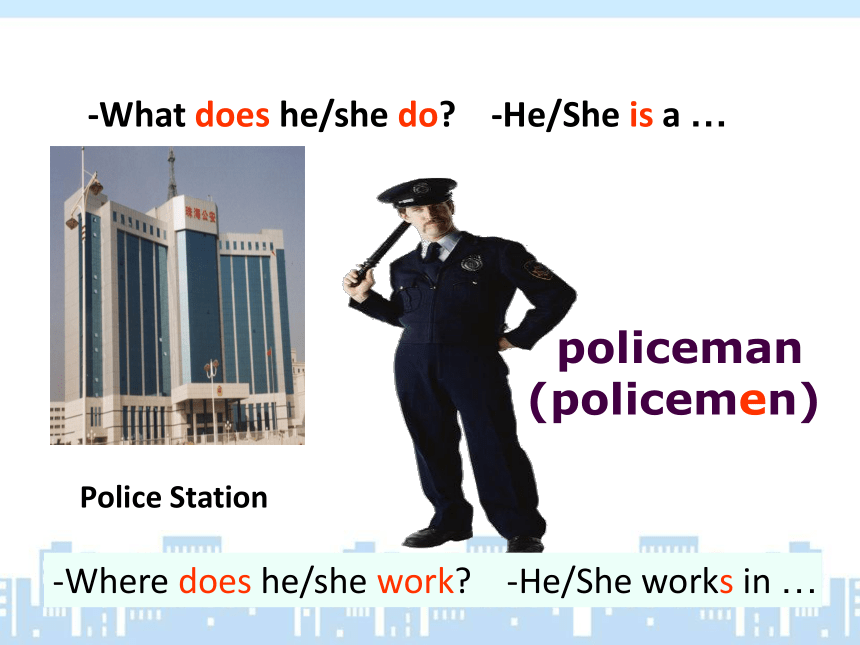
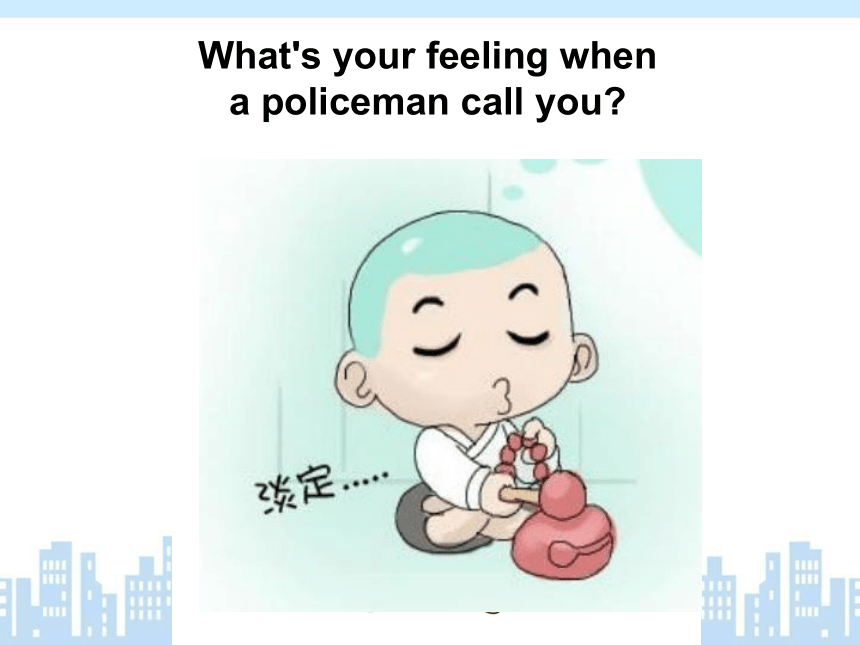
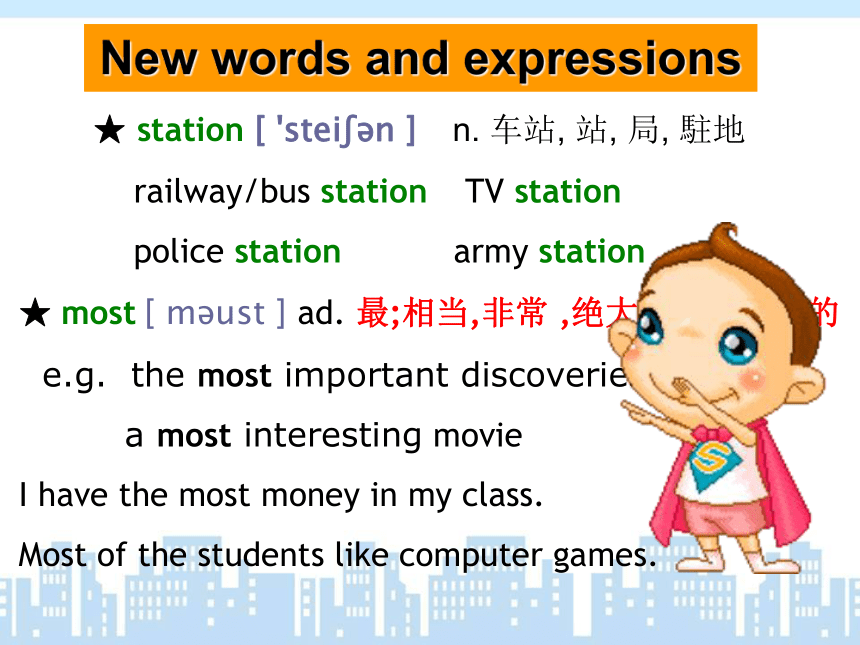
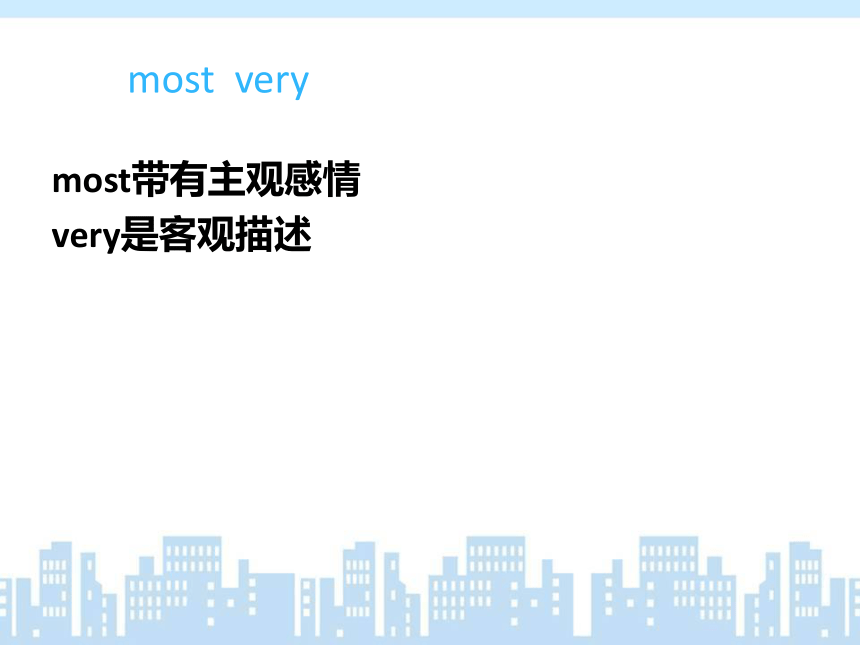
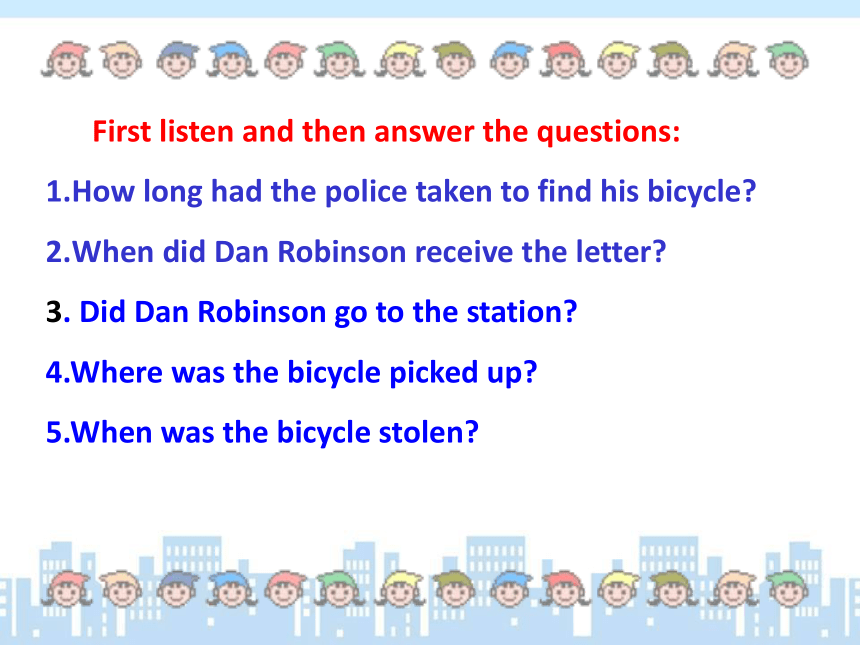
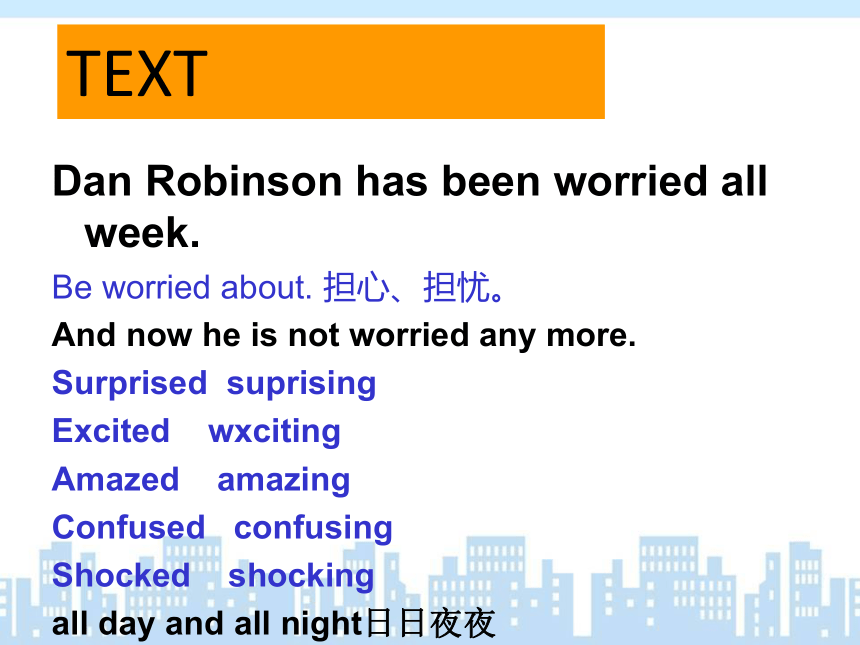
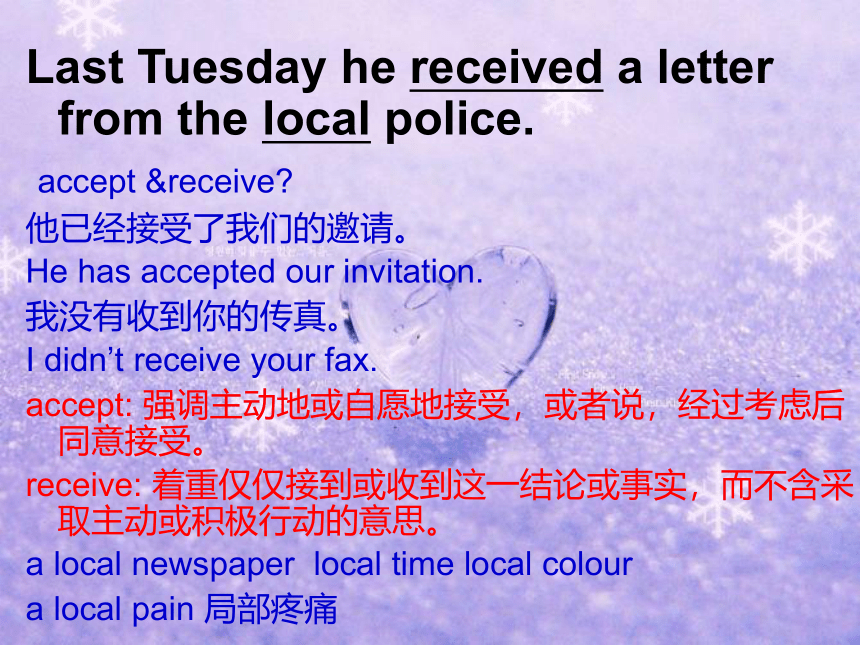
文档简介
(共30张PPT)
Lesson 34 Quick Work
Nice to meet you!
Hope for the best, but prepare for the worst.
抱最好希望,做最壞打算。
First come, first served.
先來後到。
policeman
(policemen)
-What does he/she do -He/She is a …
Police Station
-Where does he/she work -He/She works in …
What's your feeling when
a policeman call you
New words and expressions
★ station [ 'stei n ] n. 车站, 站, 局, 駐地
railway/bus station TV station
police station army station
★ most [ m ust ] ad. 最;相当,非常 ,绝大多数,最多的
e.g. the most important discoveries
a most interesting movie
I have the most money in my class.
Most of the students like computer games.
most very
most带有主观感情
very是客观描述
First listen and then answer the questions:
1.How long had the police taken to find his bicycle
2.When did Dan Robinson receive the letter
3. Did Dan Robinson go to the station
4.Where was the bicycle picked up
5.When was the bicycle stolen
Dan Robinson has been worried all week.
Be worried about. 担心、担忧。
And now he is not worried any more.
Surprised suprising
Excited wxciting
Amazed amazing
Confused confusing
Shocked shocking
all day and all night日日夜夜
TEXT
Last Tuesday he received a letter from the local police.
accept &receive
他已经接受了我们的邀请。
He has accepted our invitation.
我没有收到你的传真。
I didn’t receive your fax.
accept: 强调主动地或自愿地接受,或者说,经过考虑后同意接受。
receive: 着重仅仅接到或收到这一结论或事实,而不含采取主动或积极行动的意思。
a local newspaper local time local colour
a local pain 局部疼痛
In the letter he was asked to call at the station.
Call at: (对某地)拜访
He calls at every house in the street once a month.
call on :探望(某人);号召
你最近去看过乔治吗?
Have you called on George recently
老板号召员工们更努力地工作。
The boss called on the employees to work harder.
call out to:大声叫喊
call up打电话 call off取消
Dan wondered why he was wanted by the police,
wonder= want to know
wonder whether/if/who/when/where/what/why + 从句” 她想知道那个孩子在干吗。
She wondered what the child was doing.
我想知道他来不来。
I wonder whether/if he will come.
why引导宾语从句,用正常的陈述语气。
Hey, Jack! You’re wanted on the phone.
This is the man who is wanted by the police.
but he went to the station yesterday and now he is not worried anymore.
Not…any more:
我不能再见你了。
I can’t see you any more.I can see you no more.
我不能再等了。
I can’t wait any more. I can wait you no more.
他不再是个年轻人了。
He is not a young man any more.
Not…any more=no more
Not …any longer=no longer
At the station, he was told by a smiling policeman that his bicycle had been found.
smiling unsmiling
一只睡着的狗 a sleeping dog
一张焦虑的脸
a worried face
Five days ago, the policeman told him, the bicycle was picked up in a small village four hundred miles away.
a) 拿起,拾起: 电话铃一响,我就拿起了话筒。
I picked up the receiver as soon as the phone rang.
b) 用车接人: 我来办公室接你。
I’ll pick you up at your office.
c) (不经意) 学到: 她是在巴黎学会法语的。
She picked up French in Paris.
d)(无意地,顺便地)获得,找到: 你在哪儿买到那本书的?
Where did you pick up that book
It is now being sent to his home by train.
长江上正在修建另一座大桥。
Another bridge is being built over the Changjiang River.
我们公司正在举行运动会。
The sports meeting is being held in our company.
现在员工正在打扫车间。
The workshop is being cleaned now.
be+doing 变被动语态 be being done
Dan was most surprised when he heard the news.
most前面不加冠词,表示“非常”、“极其”
你心肠真好。
That’s most kind of you .
他对我真是彬彬有礼。
He was most polite to me.
He was amused too, because he never expected the bicycle to be found.
大家听了关于那支狗的故事都笑起来了。
Everyone was amused at/by the story about the dog.
有趣的故事 感到有趣的
amusing stories amused
expect sb. to do sth.
expect sth to be done
Jenny expected her homework to be done by Tina.
It was stolen twenty years ago when Dan was a boy of fifteen!
a boy of fifteen years old
a boy who is fifteen years old(定从)
a fifteen-year-old boy
Key language points
1. use your hand: 拿起
The bicycle was picked up in a small village 400 miles away.
2. use your car: 搭便车
I’ll drive to work tomorrow so I can pick you up at your house.
3. “use your head”: 学会,学成功
Where did you pick up your French
He picked up mending cars when he was working in a car factory.
4. 使好转,改进,增进……
Sue was able to pick up her health under the help of the doctor.
The train is slowly picking up speed.
pick sth. up ……
1. call at
2. call on
He was asked to call at the police station.
George is calling on me tonight. (Less formal)
3. call out: shout
4. call up: telephone
People on the bank called out to the man, but he
didn’t hear them.
Mr. Green will call you up tomorrow morning.
5. call off: cancel
It began to rain so we called off the match.
The couple decided to call off their reservation.
------Call------
to visit
wonder 想知道
I wonder why.
I was wondering if …
I was wondering if you can have dinner with me.
-What are you doing
-I’m just wondering.
Translation
我想去拜访一下当地的居民。(call on)
老板不能来,请取消会议。(call off)
我想问一下我可以抽烟吗?(was wondering…)
我再也不吃猪肉了。(not…any more)
call on/upon 拜访(某人) ,号召
call (sb) up 给某人打电话
call off 取消 call out(to) (向…)大声喊
call at 拜访(某地) call in 召集, 邀請
【Special difficulties】难点
Exercise 用恰当的词填空 :
1 I called______ you five times yesterday. Were you out
2 It's too late to go to the meeting. Why don't we call the whole thing ______
3 We called ______to him but he could not hear us.
4 I called ______ the post office on my way to work.
Please call me ______ tonight. This is my number.
Let's call ______ a doctor for the baby.
被动语态
在主动句中,主语是动作的实施者。被动句中,主语则是动作的承受者。
be+过去分词
不同时态的被动语态
1.一般过去时 was/were +过去分词
In the letter he was asked to call at the station.
2.现在完成时 has/have been +过去分词
I have been told to go to your birthday party.
3.过去完成时 had been +过去分词
The bicycle had been found five days ago.
rob 与 steal 的用法区别
1. 从意思上看:rob 指公开地“抢”、“夺”(通常使用暴力);而 steal 则指在人们不防备或不在场的情况下悄悄地“偷”。
2. 从结构上看,两句所使用的句型完全不同:
rob+被抢的人或地方+of+被抢的东西
steal+被偷走的东西+from+某人或某地
They robbed the bank of a lot of money. 他们从银行抢了很多钱。
They stole a lot of money from the bank. 他们从银行偷了很多钱。
Their ship was robbed. 他们船上的东西都被抢走了。
Their ship was stolen. 他们的船被偷走了。
各种时态的被动语态构成
一般现在时:
一般过去时:
一般将来时:
情态动词:
过去进行时
现在完成时:
want/except to do sth=want/except sth to be done
S+ am/is /are + done
S+can/may/must/should+be+done
S+ will + be + done
S+ was/were + being+ done
S+ have/has + been+ done
S+ was/were + done
各种时态的被动语态构成
Lesson 34 Quick Work
Nice to meet you!
Hope for the best, but prepare for the worst.
抱最好希望,做最壞打算。
First come, first served.
先來後到。
policeman
(policemen)
-What does he/she do -He/She is a …
Police Station
-Where does he/she work -He/She works in …
What's your feeling when
a policeman call you
New words and expressions
★ station [ 'stei n ] n. 车站, 站, 局, 駐地
railway/bus station TV station
police station army station
★ most [ m ust ] ad. 最;相当,非常 ,绝大多数,最多的
e.g. the most important discoveries
a most interesting movie
I have the most money in my class.
Most of the students like computer games.
most very
most带有主观感情
very是客观描述
First listen and then answer the questions:
1.How long had the police taken to find his bicycle
2.When did Dan Robinson receive the letter
3. Did Dan Robinson go to the station
4.Where was the bicycle picked up
5.When was the bicycle stolen
Dan Robinson has been worried all week.
Be worried about. 担心、担忧。
And now he is not worried any more.
Surprised suprising
Excited wxciting
Amazed amazing
Confused confusing
Shocked shocking
all day and all night日日夜夜
TEXT
Last Tuesday he received a letter from the local police.
accept &receive
他已经接受了我们的邀请。
He has accepted our invitation.
我没有收到你的传真。
I didn’t receive your fax.
accept: 强调主动地或自愿地接受,或者说,经过考虑后同意接受。
receive: 着重仅仅接到或收到这一结论或事实,而不含采取主动或积极行动的意思。
a local newspaper local time local colour
a local pain 局部疼痛
In the letter he was asked to call at the station.
Call at: (对某地)拜访
He calls at every house in the street once a month.
call on :探望(某人);号召
你最近去看过乔治吗?
Have you called on George recently
老板号召员工们更努力地工作。
The boss called on the employees to work harder.
call out to:大声叫喊
call up打电话 call off取消
Dan wondered why he was wanted by the police,
wonder= want to know
wonder whether/if/who/when/where/what/why + 从句” 她想知道那个孩子在干吗。
She wondered what the child was doing.
我想知道他来不来。
I wonder whether/if he will come.
why引导宾语从句,用正常的陈述语气。
Hey, Jack! You’re wanted on the phone.
This is the man who is wanted by the police.
but he went to the station yesterday and now he is not worried anymore.
Not…any more:
我不能再见你了。
I can’t see you any more.I can see you no more.
我不能再等了。
I can’t wait any more. I can wait you no more.
他不再是个年轻人了。
He is not a young man any more.
Not…any more=no more
Not …any longer=no longer
At the station, he was told by a smiling policeman that his bicycle had been found.
smiling unsmiling
一只睡着的狗 a sleeping dog
一张焦虑的脸
a worried face
Five days ago, the policeman told him, the bicycle was picked up in a small village four hundred miles away.
a) 拿起,拾起: 电话铃一响,我就拿起了话筒。
I picked up the receiver as soon as the phone rang.
b) 用车接人: 我来办公室接你。
I’ll pick you up at your office.
c) (不经意) 学到: 她是在巴黎学会法语的。
She picked up French in Paris.
d)(无意地,顺便地)获得,找到: 你在哪儿买到那本书的?
Where did you pick up that book
It is now being sent to his home by train.
长江上正在修建另一座大桥。
Another bridge is being built over the Changjiang River.
我们公司正在举行运动会。
The sports meeting is being held in our company.
现在员工正在打扫车间。
The workshop is being cleaned now.
be+doing 变被动语态 be being done
Dan was most surprised when he heard the news.
most前面不加冠词,表示“非常”、“极其”
你心肠真好。
That’s most kind of you .
他对我真是彬彬有礼。
He was most polite to me.
He was amused too, because he never expected the bicycle to be found.
大家听了关于那支狗的故事都笑起来了。
Everyone was amused at/by the story about the dog.
有趣的故事 感到有趣的
amusing stories amused
expect sb. to do sth.
expect sth to be done
Jenny expected her homework to be done by Tina.
It was stolen twenty years ago when Dan was a boy of fifteen!
a boy of fifteen years old
a boy who is fifteen years old(定从)
a fifteen-year-old boy
Key language points
1. use your hand: 拿起
The bicycle was picked up in a small village 400 miles away.
2. use your car: 搭便车
I’ll drive to work tomorrow so I can pick you up at your house.
3. “use your head”: 学会,学成功
Where did you pick up your French
He picked up mending cars when he was working in a car factory.
4. 使好转,改进,增进……
Sue was able to pick up her health under the help of the doctor.
The train is slowly picking up speed.
pick sth. up ……
1. call at
2. call on
He was asked to call at the police station.
George is calling on me tonight. (Less formal)
3. call out: shout
4. call up: telephone
People on the bank called out to the man, but he
didn’t hear them.
Mr. Green will call you up tomorrow morning.
5. call off: cancel
It began to rain so we called off the match.
The couple decided to call off their reservation.
------Call------
to visit
wonder 想知道
I wonder why.
I was wondering if …
I was wondering if you can have dinner with me.
-What are you doing
-I’m just wondering.
Translation
我想去拜访一下当地的居民。(call on)
老板不能来,请取消会议。(call off)
我想问一下我可以抽烟吗?(was wondering…)
我再也不吃猪肉了。(not…any more)
call on/upon 拜访(某人) ,号召
call (sb) up 给某人打电话
call off 取消 call out(to) (向…)大声喊
call at 拜访(某地) call in 召集, 邀請
【Special difficulties】难点
Exercise 用恰当的词填空 :
1 I called______ you five times yesterday. Were you out
2 It's too late to go to the meeting. Why don't we call the whole thing ______
3 We called ______to him but he could not hear us.
4 I called ______ the post office on my way to work.
Please call me ______ tonight. This is my number.
Let's call ______ a doctor for the baby.
被动语态
在主动句中,主语是动作的实施者。被动句中,主语则是动作的承受者。
be+过去分词
不同时态的被动语态
1.一般过去时 was/were +过去分词
In the letter he was asked to call at the station.
2.现在完成时 has/have been +过去分词
I have been told to go to your birthday party.
3.过去完成时 had been +过去分词
The bicycle had been found five days ago.
rob 与 steal 的用法区别
1. 从意思上看:rob 指公开地“抢”、“夺”(通常使用暴力);而 steal 则指在人们不防备或不在场的情况下悄悄地“偷”。
2. 从结构上看,两句所使用的句型完全不同:
rob+被抢的人或地方+of+被抢的东西
steal+被偷走的东西+from+某人或某地
They robbed the bank of a lot of money. 他们从银行抢了很多钱。
They stole a lot of money from the bank. 他们从银行偷了很多钱。
Their ship was robbed. 他们船上的东西都被抢走了。
Their ship was stolen. 他们的船被偷走了。
各种时态的被动语态构成
一般现在时:
一般过去时:
一般将来时:
情态动词:
过去进行时
现在完成时:
want/except to do sth=want/except sth to be done
S+ am/is /are + done
S+can/may/must/should+be+done
S+ will + be + done
S+ was/were + being+ done
S+ have/has + been+ done
S+ was/were + done
各种时态的被动语态构成
同课章节目录
